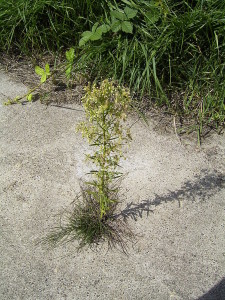Erigeron canadensis (sometimes called Conyza canadensis) is an annual plant native throughout most of North America and Central America. It is also widely naturalized in Eurasia and Australia. Common names include horseweed, Canadian horseweed, Canadian fleabane, coltstail, marestail and butterweed. It was the first weed to have developed glyphosate resistance, reported in 2001 from Delaware
Contents
Uses
The Zuni people insert the crushed flowers of C. canadensis var. canadensis into the nostrils to cause sneezing, relieving rhinitis. A tincture can be made from the dried flowering tops of the plants.
Horseweed is a preferable material for use in the hand drill method of making friction fire.
Benefits
In traditional North American herbal medicine, Canada fleabane was boiled to make steam for sweat lodges, taken as a snuff to stimulate sneezing during the course of a cold and burned to create a smoke that warded off insects. Nowadays it is valued most for its astringency, being used in the treatment of gastro-intestinal problems such as diarrhoea and dysentery. It is said to be a very effective treatment for bleeding haemorrhoids. The whole plant is antirheumatic, astringent, balsamic, diuretic, emmenagogue, styptic, tonic and vermifuge. It can be harvested at any time that it is in flower and is best used when fresh. The dried herb should not be stored for more than a year. The seeds can also be used. An infusion of the plant has been used to treat diarrhoea and internal haemorrhages or applied externally to treat gonorrhoea and bleeding piles. The leaves are experimentally hypoglycaemic. The essential oil found in the leaves is used in the treatment of diarrhoea, dysentery and internal haemorrhages. It is a uterine stimulant and is also said to be valuable in the treatment of inflamed tonsils plus ulceration and inflammation of the throat. A tea of the boiled roots is used to treat menstrual irregularities. A homeopathic remedy is made from the plant. It is used in the treatment of haemorrhoids and painful menstruation.
Cautions
Please consult your doctor for more information on side effects.
Interactions
- None are recorded.
Other names
Herb: Canada Fleabane
Latin name: Conyza canadensis
References
Source: Wikipedia, https://en.wikipedia.org/wiki/Conyza_canadensis#Uses
NaturalMedicinalHerbs, http://www.naturalmedicinalherbs.net/herbs/c/conyza-canadensis=canada-fleabane.php

